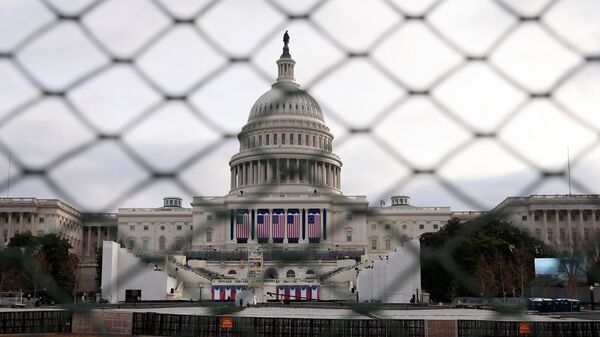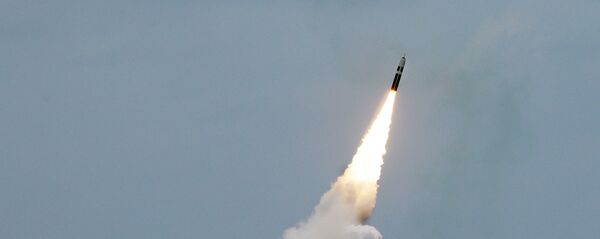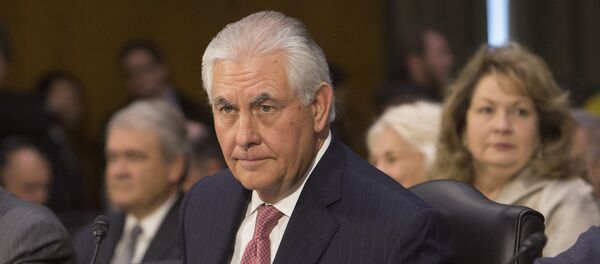The review was commissioned by Congress before Donald Trump’s inauguration as US President. The initiative was endorsed by Democratic and Republican representatives.
Congress wants the study to contain thorough descriptions of "the location and description of above-ground and underground facilities important to the political and military leadership survivability, command and control, and continuity of government programs and activities of each respective country."
"This is not the first time that US political veterans demonstrate confidence in American exceptionalism. This would be ridiculous if the US didn’t have an arsenal of over 7,000 nuclear warheads and a bad reputation," Khrolenko wrote in a piece for RIA Novosti.
Reacting to the situation, President Donald Trump on Monday accused hawkish Senators John McCain and Lindsey Graham of "looking to start World War III."
So, why does Washington want to have an updated report on Russia and China’s nuclear strike survivability?
Strategic Synergy and Preventive Tactic
Washington understands that projection of Moscow and Beijing’s economic, military and political interests beyond their borders will sooner or later lead to a confrontation with American interests.
Modernization of strategic arsenals has recently been running on all cylinders. Moscow is currently enhancing the naval and ground-based components of the military triad. Beijing places bets on mobile missile systems. Washington is sending troops and weapons to Europe. Moreover, Russia, China and the US are building a network of underground communications facilities in the event of a nuclear war.
Despite the fact that China does not want to be bound by certain political and military obligations with Russia, Beijing-Moscow bilateral strategic ties can be characterized by a positive dynamic and intense cooperation on all levels.
"In order to counter the contemporary threats, China and Russia are developing military and technical cooperation. This is not only about arms sales. Moscow and Beijing have a common geopolitical space, a possible battlefield, and coordinates positions on security issues in Southeastern and Central Asia and in the Middle East. External military and political pressure contributes to consolidation Russia’s and Beijing’s positions," the author pointed out.
"Preventive measures cannot be ruled out either. We can assume that Russia and China’s strategic nuclear forces de facto would cover for each other and to a certain extent duplicate each other. Possibly, in theory, a nuclear strike against Russia would mean not only a responsive strike, but also a preventive strike by China (and vice versa if China is attacked first)," the article read.
Trade, Not War
After the US withdrew from the agreement on June 13, 2002, Moscow announced that it would no longer consider itself bound by START II. At the time, the Russian Foreign Ministry said that due to Washington’s actions Moscow could not see any preconditions for the treaty to come into force.
"Currently, nine countries around the world have accumulated over 15,000 nuclear warheads. Even the most optimistic scenario of a nuclear war says that the global civilization would collapse into oases in the desert," Khrolenko wrote.
The author underscored that the "obsolete strategy" of developing one country at expense of other countries is "suicidal" in the 21st century.
"Washington spends billions of dollars a year on weapons. According to Western estimates, Russia’s military spending increased from 3.6 percent of GDP in 2005 to 5.4 percent in 2015. Wouldn’t it be better to use this money and this political will to develop economies, global trade and space exploration? For the majority of people, peaceful cooperation and trade are a better deal than wars," the article read.
"Russia has survived sanctions. It survived $35 oil. And it survived two years of recession. Say what you will about Vladimir Putin, Russia's economic management team has got its stuff together. […] If all goes well, Russia hits 1.7% GDP growth this year," Rapoza wrote.
"Bombing a profitable economic partner doesn’t make sense. By evaluating Russia’s and China’s nuclear survivability, the US, first of all, wants to assess its own chances to survive in this world," Khrolenko concluded.
Never miss a story again — sign up to our Telegram channel and we'll keep you up to speed!





